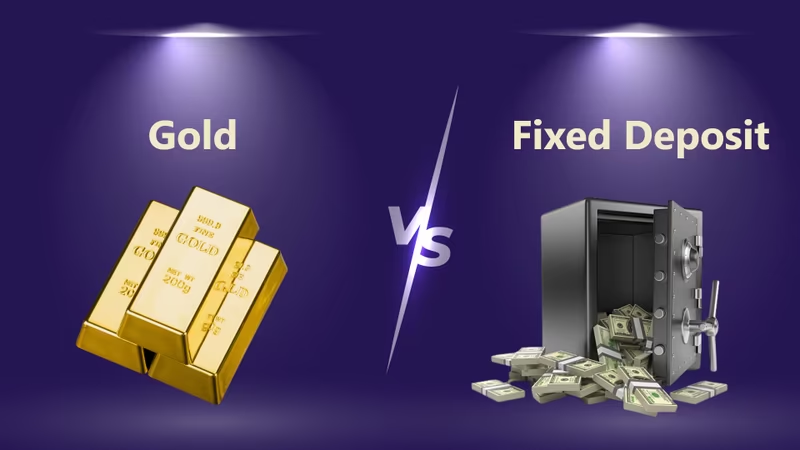When you think about investing in low-risk investments for saving and earning higher returns, what options come to your mind?
Gold, Mutual Funds and Fixed Deposit, right? And because many people are unfamiliar with mutual fund investing and SIPs, Gold and FDs are more popular among low-risk investors.
While Fixed Deposit (FD) is regarded as one of the most secure investment solutions accessible, Gold has a history of performing well when the market is at its lowest point.
Let's take a closer look at both of these.
Investments in Gold
Gold has great cultural and religious significance in India, - holding the topmost position among all metals. A prized asset. This ensures that there is always a demand for it and that its price rarely falls.
Experts advise diversifying your portfolio - at least 5 to 15% - with Gold investments to distribute overall risk. That's also because Gold is a versatile investment option with numerous advantages.
Gold is used as a hedge against inflation and other market risks. It has a decent rate of return and can yield a lot of money if sold at the correct time. It is highly liquid and can be bought or sold quickly. Even banks offer attractive rates on Gold loans.
Keep in mind, when compared to Physical Gold, Digital Gold is less risky. (How? Explore more here about - What is Digital Gold? Benefits, Risks & Taxation.)
Investments in Fixed Deposit
FD is one of the safest, easiest and quickest investment instruments available which is unaffected by external factors.
The rate of return on FDs varies from bank to bank and often runs from 4% to 6%. Profits are guaranteed, but they aren't quite as good as they can't keep up with inflation.
However, unlike mutual funds and stocks, there are no indexation advantages in FDs. So you can reduce your taxable gains by taking advantage of indexation benefits.
It also has a compounded return, which means the interest received is added to the principle for the next year.
Here's a comparison between FDs and Gold for you to figure out which is the best investment:
- Risk, Market Nature, and Safety
Gold is an internationally traded commodity, thus the market is always in flux. Many factors can influence the price and return on Gold, like - Gold supply, import, US dollar price, international trade ties, and so on.
While there is a chance that the price of Gold may rise, there is also a risk that a drop in the market will hold your Gold. The good thing is that these fluctuations aren't extreme.
Coming to FDs, their returns are unaffected by market fluctuations. It means that regardless of how the market performs, you will get predetermined returns.
Hence, you get assured returns. Just evaluate the interest rates offered by different banks and select the one that suits you the most to deposit your funds with.
- Return on Investment
Look at the price of Gold over the last five years. You will see that it climbed slowly from 2015 to 2017, but then picked up a little in 2018 and 2019.
In August of 2020, 24K gold prices increased to Rs. 55,400/10 grams.
As a result, Gold could be a viable long-term investment. Returns on FDs, on the other hand, have been disappointing.
In reality, they've been declining for some years as they aren't able to keep up with inflation.
According to data from 2020, FD returns have dropped to as low as 4.9% over a 10-year term. Most Gold investments yield a return of 4.5% to 5.5% on average.
- Investment Term Flexibility
When it comes to Gold, there are various investment forms available, like - Gold ETFs, Digital Gold, Gold stock, and Gold bullion.
The time length varies for all of these investments.
In the case of FD, you can choose from 7 days to 10 years depending on your needs. The investment term's flexibility is determined by the bank's terms.
Returns on FDs are guaranteed for the duration of the investment.
- Revenue Generation
The goal of Gold investments isn't to generate income. Gold can be viewed as an asset that can assist in the long-term generation of wealth.
However, Investors who choose monthly pay-outs on their FDs will receive monthly returns.
Compared to blocked money in the case of Gold investments, this can aid with short-term revenue generation.
- Liquidity
Gold offers a variety of options for you to invest in, like - mutual funds, bullion, equities and Digital Gold. Hence, liquidity is high. It is great for situations when you need emergency cash.
You can sell it anywhere and convert it to cash around the world if you have the original purchase receipts to prove you are the rightful owner.
Liquidity in Fixed Deposits is determined by the terms of the financial institution. If you make any premature withdrawals, you may be charged penalties.

In a nutshell, Gold and Fixed Deposit offer various rates of return over different time periods. For liquidity and long-term profits, Gold is your way to go.
On the other hand, for short term goals, guaranteed earnings and a hassle-free investment, go for Fixed Deposits.
Before making a decision, consider your risk appetite, investment goal, term of investment, cost of investment, volatility and returns.
Jar is a Daily Gold Savings app that lets you save and invest your money. It invests the spare change from your online transactions into Digital Gold, automatically.
It is the simplest & fastest way to save & invest. With Jar, you can grow your wealth with 24K Gold (Don't believe us? Check out How Daily Gold Investment is now Hassle-free with Jar App).
Buy & Sell Digital Gold, at the best Gold rates, starting at just Re.1. Download the app today.










